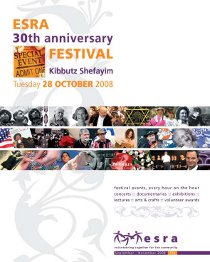
Helping Lone Soldiers
My son, Yonatan, was in a bad car crash. He spent a month in Soroka Hospital in Beersheva, and left the hospital with an iron rod in his left leg. Not good, but it could have been so much worse. When Yonatan got out of the hospital, I set out to do Bircas Hagomel for him, to thank G-D by giving charity. The question was, which charity?
One option was to donate to an established charitable organization. But some charitable organizations spend a huge chunk of their donations on salaries, rent, fundraising and other administrative expenses. And the bureaucrats who run these organizations sometimes earn much higher salaries than their donors do. Several Internet sites that I’ve visited state that a charitable organization that gives 60% of its donations to people who need help is doing a good job. That’s not good enough for me. I want all of my donation to get to people who need help. So I rejected this option.
A second option was to give cash to a poor person on the street who would get 100% of my donation. But the risk is that the person would spend my donation on cigarettes, liquor or drugs. So I rejected this option as well.
Then I thought of lone soldiers, hayalim bodedim. They serve Israel, they’re often in combat units, and they generally struggle financially. They need and deserve our help. So I decided to “roll my own” private charity. My plan was simply to find a lone soldier and to give him or her a check. My daughter, Anastasia, was serving in the medical corps. She said that there were several lone soldier girls in her unit who had come from the former Soviet Union without their parents, and they were struggling. So I simply gave Anastasia a check for $100, and she gave this check to one of the girls. The girl was so grateful! This success gave me a “warm-fuzzy,” and I had done my Bircas HaGommel for Yonatan. Case closed.
As usual, I had missed the point. When I told my friend Bob about my donation, he said, “You did something very, very rare. You bypassed all the bureaucrats, all the overheads and all the freeloaders! You gave 100% of your donation to someone who deserved it. That’s great. Now, create an organization that passes donations directly to lone soldiers. Then you can really help these kids!” But there’s the catch22. As soon as I create an organization, it has to pay all the usual administrative costs – and my “no bureaucrats” criterion goes down the drain! So I rejected this strategy as well. I had the germ of a good idea, but I couldn’t take it anywhere.
At the 2008 convention of Reform Judaism in Israel, I met Rabbi Elliot Kleinman, the director of North America’s Union for Reform Judaism. He thought about my catch-22, and solved it: “Don’t make an organization. Just tell people how to donate to lone soldiers. Then they can do it for themselves, the same as you did.” I was speechless. Rabbi Kleinman’s solution was so simple.
This is what I suggest:
- If you have a soldier in your family, use him or her as your liaison to a lone soldier. If not, see whether you can find another soldier to help you.
- Once your liaison soldier knows of a lone soldier who could use the help, he or she checks the lone soldier certificate (Teudat Hayal Boded)
- Write a non-transferable check payable to the lone soldier, which your liaison soldier will pass on. Every lone soldier has a bank account, so a non-transferable check will work fine. Your check must be in shekels to avoid high bank charges for handling foreign checks.
- I’d like to know whether this idea catches on, so if you try it, please email me at eli_lato@hotmail.com. If you can improve on the idea, please tell me how.
Eli Lato, Holon
Editors Note:
We would caution readers against simply giving money directly to one soldier to pass to another, and to first check out existing nonprofit organizations.
Lone soldiers too can apply to our ESRA Welfare Fund, and donations are welcomed for this purpose. ESRA’s activities and community projects are organized by volunteers and only 10.36% is spent on administration. 100% of all donations to the ESRA Welfare Fund go directly to the recipient.
You may also like to “adopt” a soldier far from home.
There are well-run official nonprofit organizations that work to benefit lone soldiers directly, among them the Benji Hillman Foundation, www.benjihillman.org, info@benjihillman.org, which has been featured several times in ESRA MAGAZINE. Another organization, which was featured in ESRA MAGAZINE #139 (April-May 2007), is Heseg, www.heseg.com. Heseg finances lone soldiers after their army service to study for their 1st academic degree. Others include FIDF – Friends of the Israel Defense Forces which enables line soldiers to visit their families overseas at least once during their mandatory service, www.israelsoldiers.org. In 2007 FIDF, the IDF and the Jewish Agency brought 200 parents from the Former Soviet Union, US, Europe and UK to visit their children who were serving in the army. There is also Christian Connections Unlimited, a nonprofit organization that helps Israeli lone soldiers through the Albert Owensky Lone Soldier Program, www.christianconnectionsunlimited.com
 THE RABBI’S DAUGHTER - A Review
THE RABBI’S DAUGHTER - A Review 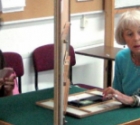 Spotlight on .....Roz Brodie
Spotlight on .....Roz Brodie 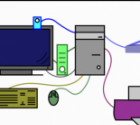 ESRA COMPUTER CLUB
ESRA COMPUTER CLUB-1536952992.jpg) Happy times of Shirley at Jockey Club
Happy times of Shirley at Jockey Club-1452334275.jpg) We've got Mail
We've got Mail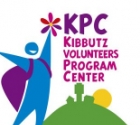 Connecting with your Kibbutz volunteer friends
Connecting with your Kibbutz volunteer friends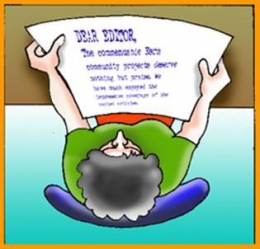 Reader
Reader